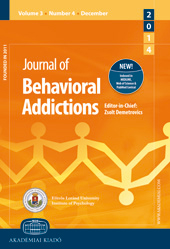The Impact of Precommitment on Risk-Taking While Gambling: a Preliminary Study
The Impact of Precommitment on Risk-Taking While Gambling: a Preliminary Study
Author(s): Damien Brevers, Xavier Noel, Luke Clark, Jekaterina Zyuzin, Joohwan Justin Park, Antoine BecharaSubject(s): Individual Psychology, Personality Psychology, Behaviorism, Substance abuse and addiction
Published by: Akadémiai Kiadó
Keywords: gambling; risk-taking; precommitment; self-control; punishment sensitivity;
Summary/Abstract: Precommitment refers to the ability to prospectively restrict the access to temptations. This study examined whether risk-taking during gambling is decreased when an individual has the opportunity to precommit to his forthcoming bet. Methods: Sixty individuals participated in a gambling task that consisted of direct choice (simply chose one monetary option among four available ones, ranging from low-risk to high-risk options) or precommitment trials (before choosing an amount, participants had the opportunity to make a binding choice that made high-risk options unavailable). Results: We found that participants utilized the precommitment option, such that risk-taking was decreased on precommitment trials compared to direct choices. Within the precommitment trials, there was no significant difference in risk-taking following decisions to restrict versus non-restrict. Discussion: These findings suggest that the opportunity to precommit may be sufficient to reduce the attractiveness of risk. Conclusions: Present results might be exploited to create interventions aiming at enhancing one’s ability to anticipate self-control failures while gambling.
Journal: Journal of Behavioral Addictions
- Issue Year: 5/2016
- Issue No: 1
- Page Range: 51-58
- Page Count: 8
- Language: English

